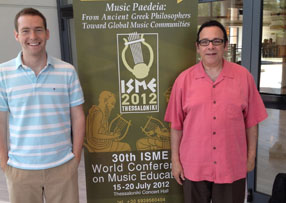Tuesday, Apr 9, 2013
Kristian Kohler's commitment to music and community recognized at the International Society for Music Education World Conference in Greece.
by Angela Romansky '13
Kristian Kohler sat alone in the bathroom of a youth correctional facility in Bordentown with fearful tears in his eyes. Wondering what he had got himself into, he recalled the past ten minutes. He had been searched, stripped of his pencils, spiral notebooks and cell phone, and led through three levels of metal doors by a prison guard. He had never expected that his college career would take him behind prison walls, but here he stood trying to gather enough courage to teach a music lesson to a room full of inmates.
It all began two years ago when Music Education and Sacred Music major Kristian Kohler ’13 was approached by classmate and fellow Music Education major Miranda Rowland ’13 and asked if he would be interested in participating in a worthwhile community program that she referred to as “Prison Choir.” After gathering a few more details and verifying that it fit into his schedule, Kohler signed himself up to be one of the two music educators who would travel to the correctional facility on Wednesday nights at 7:30.
He studied the game plan that Rowland developed when the program began. Each lesson would begin with a community-building prayer or discussion, followed by some type of warm-up that involved either body percussion or chairs, since they weren’t permitted to use instruments. They would then rehearse a few pieces.
“The goal wasn’t to rehearse for a performance, so it was really just for the group itself to learn and grow as individuals and as community members,” said Kohler.
However, all of the studying in the world could not have prepared him for that first night.
“It was scary going the first time. It was so unlike anything else I had ever done,” he said.
Once the initial shock was behind him, Kohler allowed himself to see the inmates beyond their labels. One night for an opening exercise, the men were asked to name a few things that gave them peace. He found that the majority of answers were along the lines of “thinking of family,” or “having quiet time to myself.”
“Those in prison are not any different as people, they’re just like us,” he said. “The whole experience wasn’t about ‘us and them.’ They taught me just as much as I taught them, if not more. So much of the prison system requires conforming to the rules in an effort to ‘be good.’ In attempting to get through the system they end up losing their individuality. The main goal of this for me was to give them something to be excited about, and to allow them to be creative and to grow.”
While Kohler’s dedication to the Prison Choir program certainly benefitted his students, the lessons that he learned from his students benefitted him greatly as well.
The semester after Kohler served the Prison Choir, he was approached by Professor Frank Abrahms, who had heard about the program and wanted to write an article about it, and he wanted Kohler and Rowland’s help.
“He provided the theoretical basis for the article, and we each wrote about our teaching experience,” said Kohler. “The Music Educators Journal agreed to publish it even though they don’t normally have undergraduate contributors.”
Success continued for Kohler when he was asked to present this article with Dr. Abrahams in Greece this past summer at the International Society for Music Education World Conference.
“They have a world conference every few years,” said Kohler. “We submitted a proposal based on the article with a little more research, and they invited us to present.”
Kohler and Abrahams put together a presentation with highlights from the article and split the presentation in half.
“It was really well attended-- a full room. I was nervous, but it was a great experience,” he said. “I really want to help change the perceptions of the community and be able to talk openly about my experience,” said Kohler. “The young men with whom we worked deserve a fulfilling musical life that helps to develop their personal identity and sense of community.”

